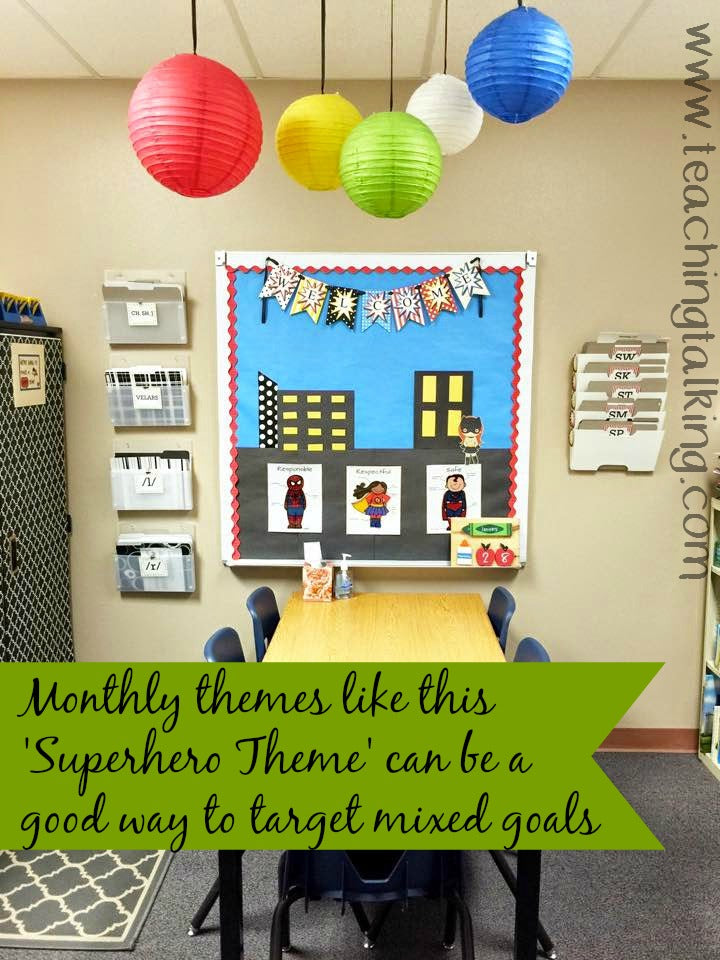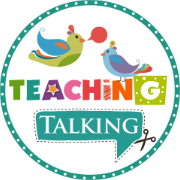
Speech Therapy Mixed Groups Made Easy for SLPs
June 03, 2016 5 min read
Working with speech therapy mixed groups can be a challenge for novice and veteran SLPs. If you’re a school-based SLP, my guess is most or all of your groups are comprised of students with a variety of goals, individually and/or as a collective. Depending on the complexity of the needs in your group, you may feel like you’re being asked to soar like an eagle even though you have no wings.

Have you ever found yourself working with speech therapy mixed groups?
I’ll admit it can be a challenge; but, I promise you working with mixed groups can be done successfully.

Most of the time, there is not a lot of flexibility about who you can place in a group because of scheduling restrictions. My groups for the last few years have pretty much been dictated by the master schedule. As a result, most of my groups are comprised of students from the same grade but different classes, and of course, different goals. My block of time for each grade level is relegated to the small window of time allotted for science or social studies. With that being said, I have had articulation, fluency, language (vocabulary, grammar, pragmatics, etc.) all in one group. If you serve a single school, you may have a little more flexibility, but, if you serve multiple schools, the challenge of working with mixed groups is even greater. Regardless of the scenario, mixed groups are becoming more common than uncommon because of large caseloads, diversity of students’ needs, and limited time. Have no fear and whatever you do, don’t stress. The suggestions in this post can help you implement functional and effective therapy with mixed groups.
The first thing to do when working with mixed groups is to develop and utilize a growth mindset:

| Fixed Mindset | Growth Mindset |
| “Mixed groups are almost impossible.” | “Mixed groups are a challenge; but, I’m up for the challenge and the growth.” |
| “It’s going to be hard to address so many goals.” | “Other SLPs are experiencing success with mixed groups, so my students and I can too.” |
| “Collecting data on mixed groups is hard.” | “Data collection may require me to think outside of the box or change my system a bit, but I can do it.” |
Working with speech therapy mixed groups requires planning, but again it can be done. Before sharing suggestions for therapy, let me advise you to establish firm guidelines and expectations for behavior and be consistent when enforcing them. As with any group, behavior management is critical.
 With speech therapy mixed groups , it is often necessary to address the “elephant in the room” (everyone isn’t working on the same thing.) This is where your posted expectations for therapy etiquette or behavior related to respect and diversity comes in handy. Some children, unfortunately, try to critique others or become impatient because they simply can’t understand why their peer(s) can’t say the correct sound(s), follow directions, and/or answer questions, etc. If the behavioral rule is posted near you, you can point to the expectation as a reminder any time a student “forgets.” At the very beginning of the year, I share with my students that everyone is there because they ALL need to improve in some area of communication. Not all needs are the same; but, everyone has them or they wouldn’t be receiving therapy.
With speech therapy mixed groups , it is often necessary to address the “elephant in the room” (everyone isn’t working on the same thing.) This is where your posted expectations for therapy etiquette or behavior related to respect and diversity comes in handy. Some children, unfortunately, try to critique others or become impatient because they simply can’t understand why their peer(s) can’t say the correct sound(s), follow directions, and/or answer questions, etc. If the behavioral rule is posted near you, you can point to the expectation as a reminder any time a student “forgets.” At the very beginning of the year, I share with my students that everyone is there because they ALL need to improve in some area of communication. Not all needs are the same; but, everyone has them or they wouldn’t be receiving therapy.
Basically, I start off with a social skills lesson about identifying and respecting the differences of others, and learning to work together. With my older students, I use “How Katie Got a Voice (and a cool new nickname)” by Patricia Mervine (SLP). If you want to know more about the book, check here for an introduction. After reading the book, we review this video and discuss personal choices, preferences, strengths, and needs.
There are free resources that address multiple skills and would be great to use in a mixed group: (click links to see more)
If I have a really creative bunch, we pick positive nicknames that emphasize a strength or hobby for each student and post them on the door or a board. I know that seems like a lot to set the expectations; but, I’ve done it for 2 years now, and the results have been great because I typically don’t have to deal with students making fun of each other. When working with mixed groups, there is nothing worse than the look of sadness or dread in a child’s eye because they’ve been embarrassed because of his/her needs. Just remind your students that EVERYONE in the group is working on improving at least one skill, and everyone is to be treated with respect.
Once the group etiquette is firmly established, you’ve done the hardest part (in my opinion). With a little planning you can and will have successful speech therapy mixed groups. There are a few ways to address group therapy. You may find one method and use it all the time, or you may use a combination of methods and resources.

One common, efficient way to target goals in mixed groups is to use monthly themes. Themes can be used with all grade levels. Sometimes your school may have a schoolwide theme that you choose to use, or you may choose a theme of your own. The key is to plan ahead of time, and see what resources are already available to meet the needs of your students.
 Books are also great resources for providing functional and appropriate therapy when working with speech therapy mixed groups. You can address almost any goal with books. Creating and facilitating the use of interactive notebooks for students is another excellent way to provide therapy in mixed groups. With interactive notebooks, students can review previous therapy activities when the SLP is working with other students.
Books are also great resources for providing functional and appropriate therapy when working with speech therapy mixed groups. You can address almost any goal with books. Creating and facilitating the use of interactive notebooks for students is another excellent way to provide therapy in mixed groups. With interactive notebooks, students can review previous therapy activities when the SLP is working with other students.

Playing has a place in learning, and you can definitely address multiple goals using generic commercial games. In addition to generic commercial games (see my best board games for speech therapy post for some ideas), there are quite a few commercial learning games that target specific communication skills. You can refer to the following resources for lists of commercial board games that target specific skills:
- Board Games Related to Expressive Language
- Board Games Related to Receptive Language
- Board Games Related to Articulation Phonological Disorders Fluency and Voice
In addition to commercial board games there are many materials created for SLPs by SLPs. Pinterest and TpT are your friends! Based on my experiences, it is better to develop and maintain consistent expectations but to diversify the activities. Whatever you do, don’t be intimidated by the challenge. Rise up to the challenge and soar like an eagle because you’re an:

Bio: Truvine Walker obtained her undergraduate and graduate degrees in Speech-Language Pathology on the beautiful campus of Valdosta State University in Valdosta, GA. After 3 years of working in the public schools in northern Virginia, Truvine decided to broaden her horizons and explore the world of travel therapy. As a traveling SLP, Truvine has worked in schools, hospitals, skilled nursing facilities, outpatient clinics, and inpatient rehabilitation facilities in a total of 8 different states. Truvine is finishing up her 17th year as an SLP, and is just as excited about the profession as she was in the very first year. In addition to loving learning about all things speech and language, Truvine loves bowling, reading, sightseeing, spending time with family, and of course, traveling.
★ If you enjoyed this post, you might also like to read my Speech Therapy Reading Activities post ★

